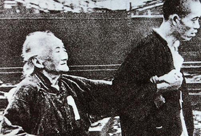 Fighters of Lanzhou MAC in confrontation training
Fighters of Lanzhou MAC in confrontation training
 3D printing to trigger third industrial revolution
3D printing to trigger third industrial revolution
 Top 10 brands that win rich women's hearts
Top 10 brands that win rich women's hearts
 Deng Xiaoping: 'I have a clear conscience all my life'
Deng Xiaoping: 'I have a clear conscience all my life'
 Xi Jinping: 'The people are our strength'
Xi Jinping: 'The people are our strength'
 Amazing cliff diving in cold winter
Amazing cliff diving in cold winter
 Enjoy Sochi 2014 in slow motion
Enjoy Sochi 2014 in slow motion
 University student sentenced to death for poisoning roommate
University student sentenced to death for poisoning roommate
 Chinese lunar New Year celebrated in San Francisco
Chinese lunar New Year celebrated in San Francisco
DIALOGUE 2
Xinhua: Where do you learn about Chinese culture? Can you name some of the problems when China promotes its culture to other countries?
Twenty-eight-year-old Nairobi resident Belly said he got to know Chinese culture through Chinese people working there. "Unfortunately, most Chinese people prefer talking about business. It's a pity that they do not discuss much about their culture with us," he said.
He suggested that overseas Chinese be "more socially open" and the Chinese government hold more expos in Africa. "Maybe China should organize a fashion exhibition because I am really curious how the Chinese women are dressed," he added.
Kim Inki, CEO of MaxTimes Korea, a South Korean company, suggested that China introduce more movies and TV programs to other countries so as to further improve its cultural influence globally.
Chinese movie makers and TV program producers still have a lot of work to do to make Chinese entertainment more attractive, said Kim.
DIALOGUE 3
Xinhua: What do you think China should do after the "two sessions" in order to enhance the international influence of Chinese culture?
Kimura Yoichiro, director of KOYONPLETE, a Japanese video game company, said China's animation production level will go up if its cultural industry is more open.
"China does not lack good painters. However, many of Chinese painting students ... hardly get a chance to work on something they like after graduation," said Yoichiro.
"More openness in China's animation industry means broader Chinese market and more cooperation opportunities for us," added the director.
To Akiko Sugimoto, a reporter on international affairs at Japan's NHK, China is the "treasure house of documentary materials."
"China can produce excellent documentaries," said Sugimoto. "As a cultural consumer, I am strongly supportive of China spreading its culture to the world."
"People around the globe are curious about what's China like and what the Chinese are thinking about," noted the reporter. "But China has for now given little response to this curiosity and we have known little of China. That breeds ideas such as 'China threat.'"
But Sugimoto said the development of China's cultural industry will be more anticipated after the "two sessions."
Closer cooperation with China on the cultural front is also supported by Luigi Corbani, general manager of the Giuseppe Verdi Symphonic Orchestra of Milan.
"There is so much to know about Chinese culture. ... It is difficult to imagine that any other country would have opened its arms to the rest of international culture through exhibitions, cultural activities and cinemas in such a short period of time to the extent China has done," he said.
The "unique and extraordinary" pace of opening has given more strength to China, he said, adding that his orchestra is considering to deepen exchanges with China.

 Chaihe village, pure and peaceful fairyland in snow
Chaihe village, pure and peaceful fairyland in snow Belgians warmly welcome arrival of China's giant pandas
Belgians warmly welcome arrival of China's giant pandas Female marines receive tactical training in NW China
Female marines receive tactical training in NW China Blood memory: Nanjing Massacre in 1937
Blood memory: Nanjing Massacre in 1937 Top 10 pure beauties in showbiz
Top 10 pure beauties in showbiz British WWII veteran: I can't forgive Japan
British WWII veteran: I can't forgive Japan Tongban's dream of prosperity
Tongban's dream of prosperity Chinese frigate Yancheng holds drills in Mediterranean Sea
Chinese frigate Yancheng holds drills in Mediterranean Sea A visit to comfort woman's home in South Korea
A visit to comfort woman's home in South Korea Fairyland? Qingdao in sea of clouds
Fairyland? Qingdao in sea of clouds Top 10 most handsome faces in Asia in 2013
Top 10 most handsome faces in Asia in 2013 Female celebs with beautiful long legs
Female celebs with beautiful long legs Cat 'guardians' in Forbidden City
Cat 'guardians' in Forbidden City Large numbers of ancient coins excavated in Inner Mongolia
Large numbers of ancient coins excavated in Inner Mongolia Leisurely life beneath Zhonggulou, where time travels slower
Leisurely life beneath Zhonggulou, where time travels slowerDay|Week|Month